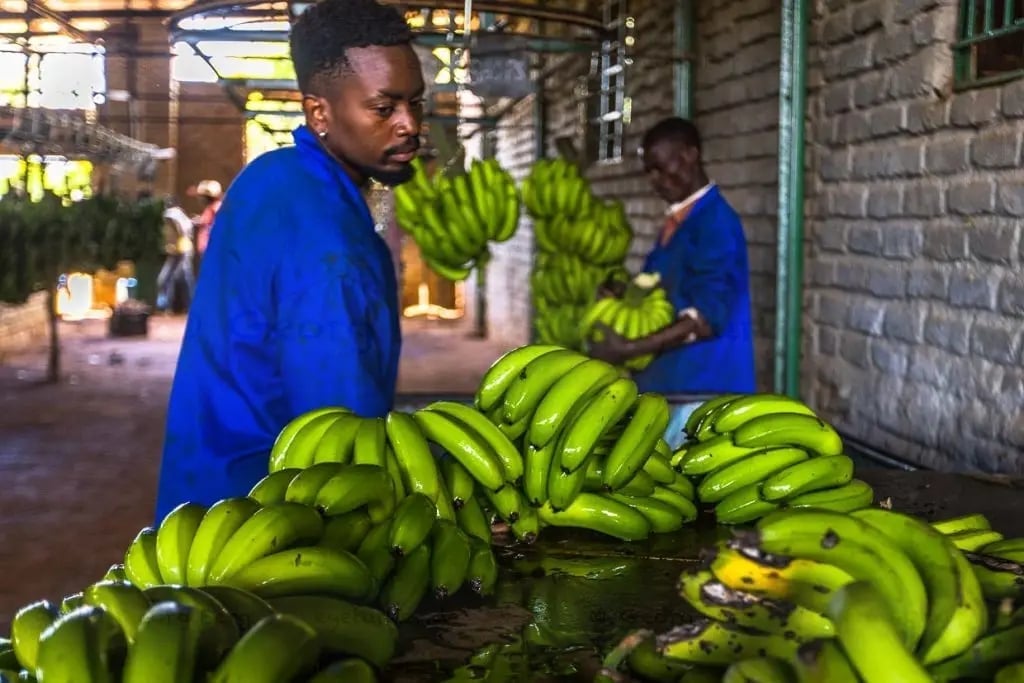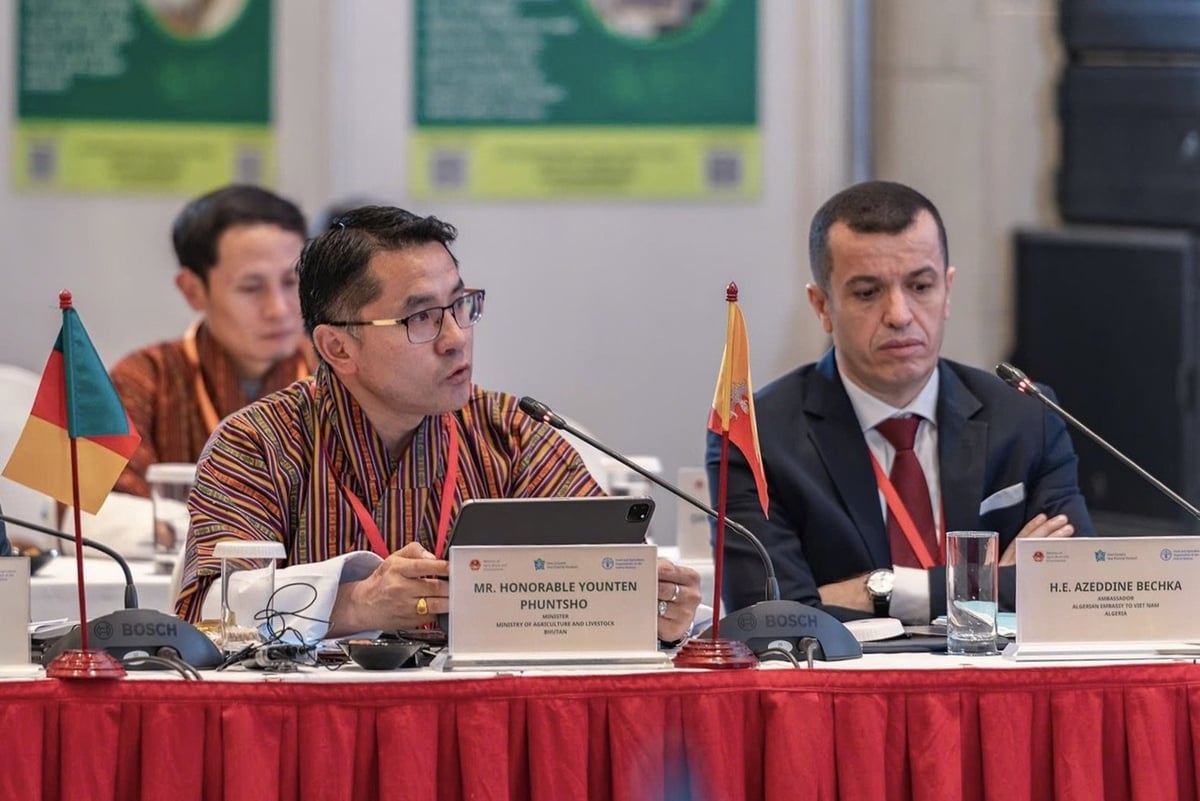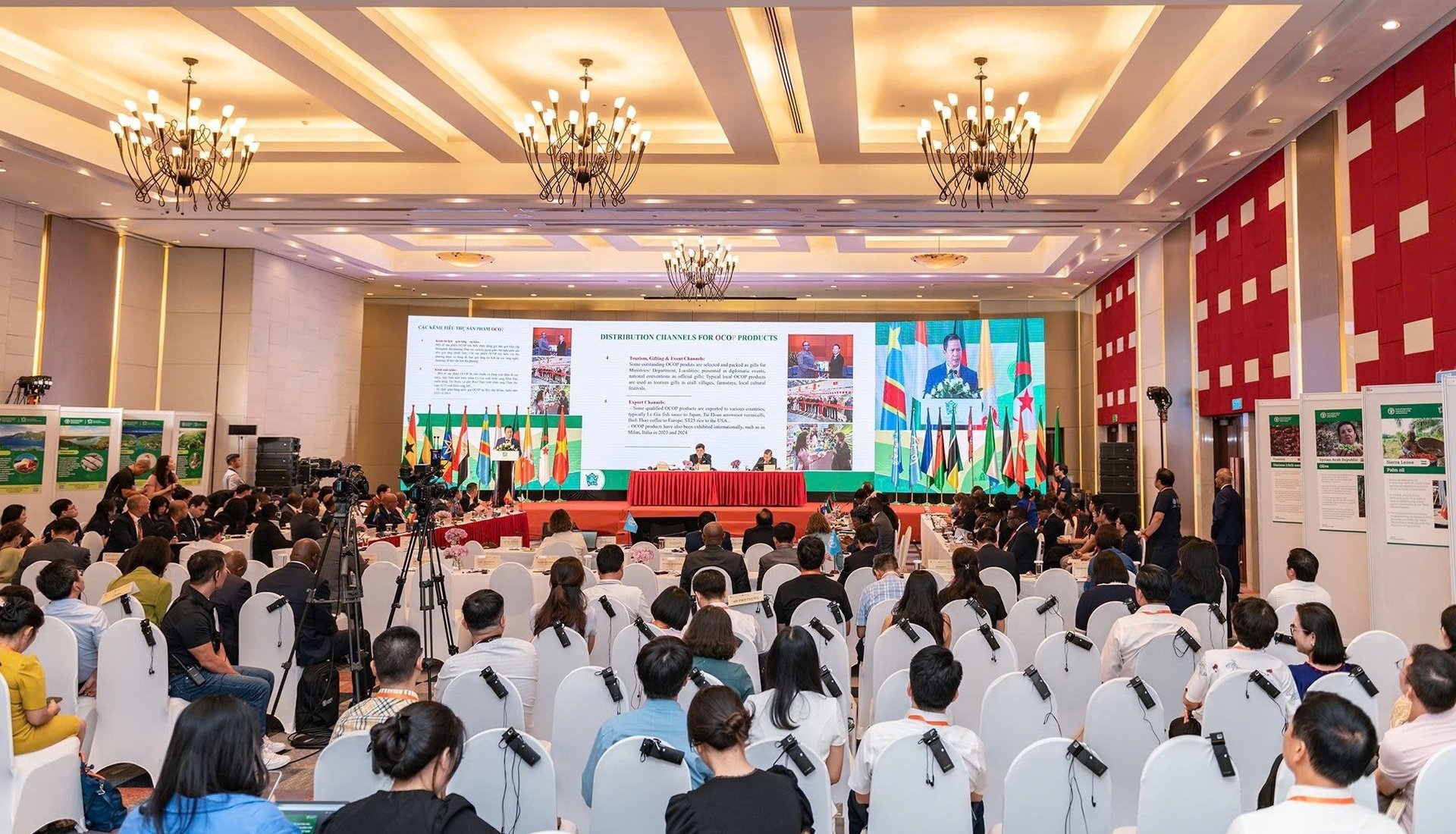January 2, 2026 | 18:15 GMT +7
January 2, 2026 | 18:15 GMT +7
Hotline: 0913.378.918
January 2, 2026 | 18:15 GMT +7
Hotline: 0913.378.918
At the High-Level Interregional Knowledge Exchange on the the One Country One Priority Product (OCOP) model, co-hosted by the Ministry of Agriculture and Environment and the FAO on July 15-16, countries such as Malawi, Bhutan, and Cameroon shared common challenges, including small-scale production, limited processing capacity, high post-harvest losses, and difficulties in expanding value chains and developing competitive agricultural brands for export markets.
In light of these challenges, agricultural leaders expressed confidence that OCOP can serve as a platform for connection and collaboration. By combining the experiences of Vietnam with shared efforts, countries can identify practical solutions to help transition toward sustainable agriculture and unlock the potential of local communities.

Malawi has implemented various strategies to support banana growers through the OCOP initiative.
Mr. Sam Dalitso Kawale, Minister of Agriculture of Malawi shared that Malawi’s journey with OCOP has been a transformative one, beginning with a critical challenge: the collapse of its banana industry due to the Banana Bunchy Top Virus, which devastated over 20,000 hectares of banana crops. This not only affected agricultural output but also severely impacted the livelihoods of communities dependent on the banana value chain.
OCOP provided not just support, but a structured and hopeful pathway for recovery. Malawi was selected as a demonstration country under the initiative, and since then, the government and communities have embarked on comprehensive efforts to rebuild the sector. The introduction of healthy banana plants through improved tissue culture techniques in laboratories has been a central intervention. Alongside this, community-run banana farms with modern irrigation systems have been established, helping to revive local production.
A key element of Malawi’s approach has been investment in extension services. The country has emphasized training officers, researchers, women, and youth through farmer field schools that demonstrate green and modern agricultural practices. This hands-on, inclusive method of training reflects the belief that farmers learn best by doing rather than simply being told.
Malawi’s vision extends beyond short-term recovery. The efforts under OCOP are aligned with Malawi Vision 2063, which aspires to build a productive, industrialized, and inclusive economy. In this regard, Vietnam has served as an important model. The speaker noted the impressive progress Vietnam has made in integrating technology, productivity, and community development in its agricultural sector. Malawi has been particularly inspired by Vietnam’s OCOP model, especially its community-led product specialization, robust product rating system, and the integration of agriculture with digital marketing and tourism.
Drawing from Vietnam’s success, Malawi aims to support local product development, adopt digital innovations, enhance product quality and branding, and strengthen community involvement, especially among women and youth. Plans are in place to scale up tissue culture production, create new farmer innovation groups, and promote affordable post-harvest technologies.
Malawi closed its remarks by pledging to continue learning from others, including Vietnam, and to share its experiences as it progresses toward becoming a leading country in OCOP implementation.
Bhutan began by expressing deep appreciation to FAO for the opportunity to share its experience using science, technology, and innovation to transform its agrifood sector through the OCOP (One Country One Priority Product) model. Bhutan regards the OCOP initiative as a timely and strategic platform that aligns well with its national development philosophy of Gross National Happiness and the Bhutan Agrifood Sector Strategy 2034.
The country’s approach to agrifood transformation has been described as systematic and inclusive, rooted in FAO’s "Four Betters": Better Production, Better Nutrition, Better Environment, and Better Life. Bhutan emphasized that agriculture is not viewed solely through the lens of productivity or profit, but through values of equity, sustainability, and collective well-being.
Under Better Production, Bhutan has promoted quinoa cultivation since 2015, with FAO’s support. Quinoa is now grown across all six agroecological zones, from subtropical lowlands to alpine regions above 3,500 meters. It has proven resilient to temperature extremes and low rainfall. The government has released four adaptable quinoa varieties following agronomic trials and is using a GIS-based crop suitability model to optimize land use. A real-time weather station aids climate-smart farming and pest management. Bhutan has also conducted multi-location seed trials to improve genetic resources and variety performance, while training over 140 agriculture officers in production, post-harvest handling, nutrition, and recipe development. A price guarantee scheme ensures stable markets and fair returns for farmers.
For Better Nutrition, Bhutan is using quinoa to address the country’s triple burden of malnutrition and the rise of non-communicable diseases. The crop’s high protein and micronutrient content makes it ideal for incorporation into feeding programs in schools and hospitals, where early feedback has been highly positive.
Regarding Better Environment, Bhutan reaffirmed its commitment to carbon neutrality and biodiversity conservation, mandated by its Constitution. The country maintains over 60% forest cover and is already carbon-negative. OCOP supports this vision as quinoa is well-suited for low-input, rainfed systems and can be cultivated on marginal lands, helping reduce environmental degradation.

Mr. Younten Phuntsho, Minister of Agriculture and Livestock shares about Bhutan's OCOP vision for sustainable development of value chains and people's livelihoods. Photo: Tran Van.
In terms of Better Life, Bhutan prioritizes innovation-driven rural development to narrow the rural–urban divide, especially since over 60% of its population lives in rural areas. The country is digitizing farm-level data through a farmer registration system supported by the EU and FAO, which will enable input traceability and evidence-based policymaking. Its Digital Druk Flagship Program enhances farmer access to markets, weather data, and public services. Youth and women are being engaged in agri-tech solutions like hydroponics, vertical farming, and agri-tech incubation to slow rural–urban migration.
Looking ahead, Bhutan aims to expand quinoa cultivation to 4,000 acres involving 4,000 farming households, creating jobs and increasing rural incomes. The country is also investing in South-South and triangular cooperation through partnerships with FAO and Mahidol University in Thailand to develop EcoHub models, digital innovation frameworks, and quinoa packaging facilities.
In conclusion, Bhutan's OCOP journey demonstrates a strong integration of science and innovation in value chain development. The country is clearly committed to achieving FAO’s Four Betters and its own national development goals.
According to Mr. Hussein Abdelbagi Ayii, the Ministry of Agriculture and Food Security of South Sudan, the country selects sorghum as its priority crop due to its status as a traditional staple food consumed across nearly all regions of the country.
The country faces multiple institutional, technical, and financial challenges in implementing OCOP. These include limited knowledge and skills in using improved and climate-resilient sorghum varieties, poor access to mechanized farming technology, post-harvest handling systems, and limited value addition and market development. The speaker also highlighted a lack of access to credit and financial services and insufficient technologies to mitigate the effects of climate change, droughts, pests, and diseases.
To address these issues, the government is working to strengthen the technical, institutional, and financial capacities at both the national and state levels. Key measures include promoting environmentally appropriate technologies, such as ox-drawn plows and tractors. The South Sudanese government has already provided some tractors and plans to acquire more to increase productivity and enable surplus production of sorghum and other crops.
A key policy directive involves each of the 13 states designating 250,000 feddans of land for agricultural demonstration purposes. These efforts are intended to drive investment in innovation and promote modern post-harvest technologies.

The first professional meeting brought together leaders of the Ministry of Agriculture to discuss solutions to overcome difficulties in production, processing and positioning OCOP product brands. Photo: Tran Van.
South Sudan also emphasizes the strengthening of extension services, aiming to deliver timely and effective support to individual farmers, farmer cooperatives, and community organizations. Through support from FAO, the European Union, the World Bank, and other development partners, community-based centers have been established to carry out adaptive trials and technology demonstrations, helping to disseminate best practices and appropriate innovations.
According to Mr. Ramnath Adhikari, Ministry of Agriculture and Livestock Development, Nepal, under the OCOP framework, Nepal conducted a comprehensive assessment of the entire large cardamom value chain, from production to consumption, and found both encouraging progress and pressing challenges.
At the production stage, farmers are hindered by aging plantations, some over 20 years old, leading to declining yields. In post-harvest handling, traditional firewood-based drying methods are still widely used. While familiar, these practices often result in uneven drying, smoky odours, and a loss of essential oils, reducing both the quality and export value of the product. Processing and value addition are limited, with most enterprises stopping at basic drying and storage. Few invest in modern equipment to produce high-value products such as cardamom oil, powder, or herbal blends, which could open doors to new domestic and international markets.
In response, Nepal has initiated a comprehensive value chain development strategy. Efforts include promoting improved planting materials, organic certification, and integrated pest management. The government is piloting modern post-harvest technologies such as solar and biomass dryers in collaboration with cooperatives and private sector partners. Training programs are helping producer groups improve aggregation and establish stronger links with processors and exporters. Nepal is also exploring new export markets beyond South Asia and working to create a unique “Nepali cardamom” brand, emphasizing its purity, sustainability, and high-altitude origin.
The minister expressed sincere appreciation to the Vietnamese government and FAO for their leadership in advancing the OCOP initiative. He described Vietnam’s OCOP model as deeply inspiring and practically relevant to Nepal’s context. Three key aspects of Vietnam’s approach resonated strongly.
Vietnam’s private sector engagement and South-South cooperation efforts were acknowledged as important pathways that Nepal hopes to follow. Nepal expressed interest in deepening collaboration with Vietnam and other OCOP countries to collectively advance resilient, inclusive, and market-linked agrifood systems in the region.
Translated by Linh Linh

(VAN) Located in three former provinces, Nam Dinh, Thai Binh, and Ninh Binh, and now in two provinces, Ninh Binh and Hung Yen, "Red River Delta" is the name of Vietnam's first interprovincial coastal wetland World Biosphere Reserve.
/2025/12/29/1046-1-210728_624.jpg)
(VAN) In 2025, Viet Nam recorded severe and extreme disasters, breaking multiple historical records and causing heavy losses in lives, property, and infrastructure nationwide.

(VAN) Applied technologies, water-saving irrigation is a strategic solution to promote climate-resilient agriculture and strengthen water security in the uplands.
/2025/12/29/3936-3-163422_251.jpg)
(VAN) Can Gio mangrove forest in particular and the entire Can Gio Mangrove Biosphere Reserve in general hold great potential for carbon credits.

(VAN) Chu Pah Rubber has announced its products that comply with the EU Deforestation Regulation (EUDR), affirming its commitment to sustainable production and product origin transparency.

(VAN) Deputy Director Nguyen Hoai Nam stated that a digital data platform will be developed with agricultural sector databases, utilizing AI to help farmers make informed decisions on 'watering correctly, sufficiently, and efficiently.’
/2025/12/29/4841-2-134224_777.jpg)
(VAN) From only about 10 individuals in 2009, the wild elephant population in Dong Nai has recovered to nearly 30 animals after more than 10 years.